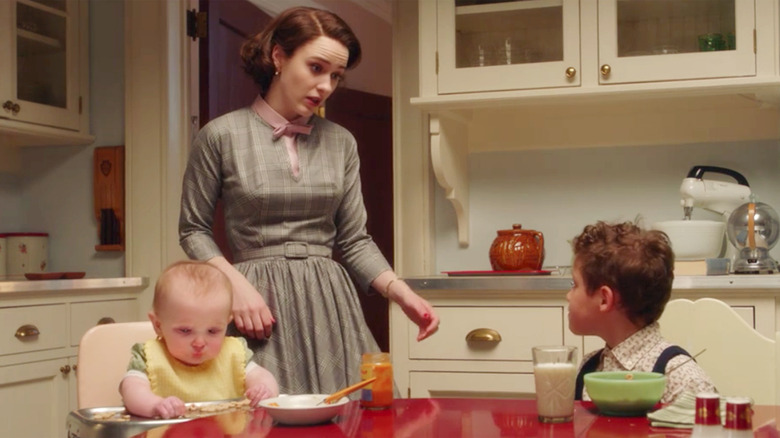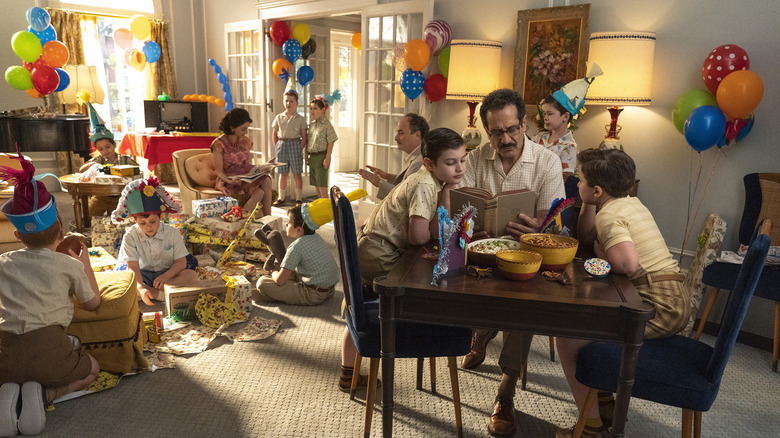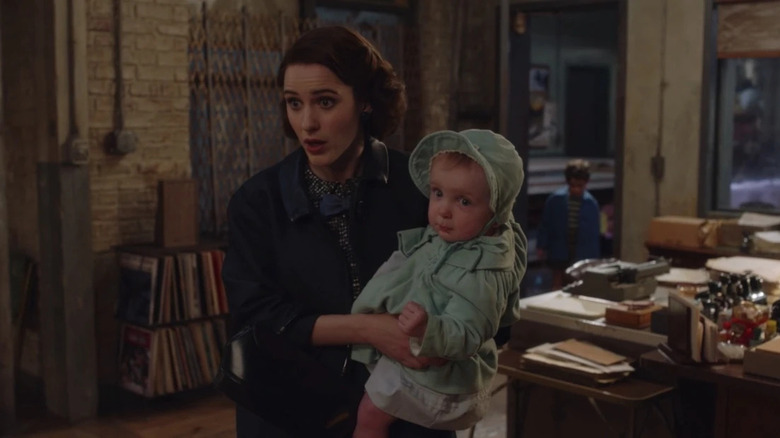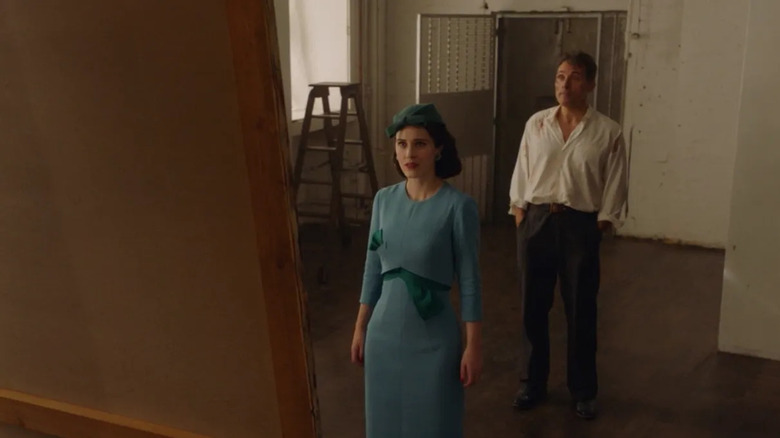The Marvelous Mrs. Maisel Season 5's Riskiest Choice Improves The Show In Every Way
This piece contains spoilers for the season 5 premiere of "The Marvelous Mrs. Maisel."
One of the funniest moments in the season 5 three-part premiere of "The Marvelous Mrs. Maisel" is the nighttime hallway scene with Midge (Rachel Brosnahan) and her young unconscious son Ethan (now played by Colin Keane). After an episode of debate and frustration over how to get Ethan to sleep in his room, Midge ends up dragging him up and down the hallway for an absurdly long time, arguing with her father (Tony Shalhoub) while they both make zero effort to keep their voices down.
It's a ridiculous scene for two reasons: the first is the implausibility of it all, the idea that none of this would wake Ethan up. The second is the fact that Midge clearly isn't pulling an actual kid around. It looks like an obvious prop child in that sleeping bag, and the show barely even attempts to hide this from the audience.
It's a fitting choice, because even in the scenes where Ethan is awake and being played by the actual actor, he's always seemed like a glorified prop. He and his younger sister Esther have always been afterthoughts, no more than window dressings in any given scene. The adult characters get to have personalities and agency, while the kids never do. So for the first four seasons, audiences were left pondering a question that the show itself seemed uninterested in: are we supposed to think Midge is a bad parent?
A bit of a loaded question
Of course, Joel (Michael Zegen) isn't off the hook here, either. Much like Midge, most of Joel's scenes with the kids are just him dropping them off at someone else's house so he can go off and do whatever he wants. Neither parent is ever shown to be particularly mean to the kids, and the kids don't seem to resent them yet, but there's rarely any sense of love or interest given to either of them. Joel and Midge treat taking care of the kids the same way they'd treat brushing their own teeth or getting dressed; it's just something they have to do before they can get on with their day.
But for most of the show, it was unclear if this was supposed to be seen as a character flaw Midge and Joel shared, or just a meta joke. As much as people tend to find small children adorable in real life, kids rarely make for compelling TV characters, so "The Marvelous Mrs. Maisel" did the smart thing and sidelined them in favor of the juicier adult relationships. The show knew that viewers were here for Midge's journey to becoming a famous comedian, not for Ethan and Esther. Sure, the lack of attention paid to them might make Midge and Joel seem heartless, but it's the sort of character flaw audiences find easy to forgive. We can't get on their case for not spending more time with their kids because, well, we're not interested in spending time with them either.
The season 5 twist
This all gets flipped on its head in the season 5 cold open, which gives us an adult Esther (Alexandra Socha) venting to her therapist. This Esther looks and sounds a lot like Midge, except she's a lot more hyper and seems to really hate her mother. She's not a total mess, of course; she seems to be a bit of a science whiz, which earns her some genuine praise from her (otherwise very concerned) therapist. But of course, it's not the therapist's approval she's looking for. When he tells her that her work is "a monumental achievement," she yells back, "Oh yeah? Well, tell that to my mother!"
23-year-old Ethan (Ben Rosenfield), meanwhile, has taken his life in a quieter direction. He enjoys a peaceful life working at a farm in Israel, far away from where his mother typically is. He doesn't outright despise his mother, it seems, but their relationship certainly seems distant, and neither of them seem to be in any hurry to change that.
Notably, both Ethan and Esther seem completely uninterested in show business. With Esther becoming a scientist and Ethan choosing an undramatic life as a farmer, they've both watched Midge's career throughout their childhood and have firmly decided it's not for them. There could be plenty of reasons for this; maybe they resented her for making jokes about them in her stand-up, or all the fame and money just made a Midge a less happy person. The most likely explanation, as these first three episodes make clear, is that Midge's stand-up career meant she was barely there for her family, and neither Esther nor Ethan want that for themselves or their future kids.
The cost of art
Already, these flashforwards have shifted the feel of the show. Before, the show's defining question was whether or not Midge could make it big. Now we know for sure the answer's yes, so the new big question is: at what cost? It's following up on a theme first properly introduced in the season 2 episode, "Look, She Made a Hat," in which Midge finds herself talking to a talented painter whose personal life has completely fallen apart. "If you want to do something great, you want to take something as far as it'll go, you can't have everything," he tells her. "You lose family. Sense of home."
Sure enough, that's exactly what's happened in season 5's flash-forwards. Midge's relationship with Susie has apparently fallen apart, she's had three more failed marriages, and most importantly, her kids don't like her. She's gotten the fame we've always wanted her to have, but was it worth it?
By showing us the future, every new moment between Midge and her kids has a double meaning that wasn't there before. When she drags her child across the floor like he's an inanimate object, it's no longer just a funny gag; it's a sad reminder of what's in store for these kids once they're old enough to be resentful. Treating your kids like afterthoughts has consequences, and now we've seen exactly what those consequences are.
With this single narrative choice, "The Marvelous Mrs. Maisel" has made it clear that this isn't going to be the straightforward, triumphant finale we always expected. Season 5 so far has a strong, unexpectedly tragic undercurrent to it, and maybe that's what makes for the grand send-off the "The Marvelous Mrs. Maisel" deserves.



